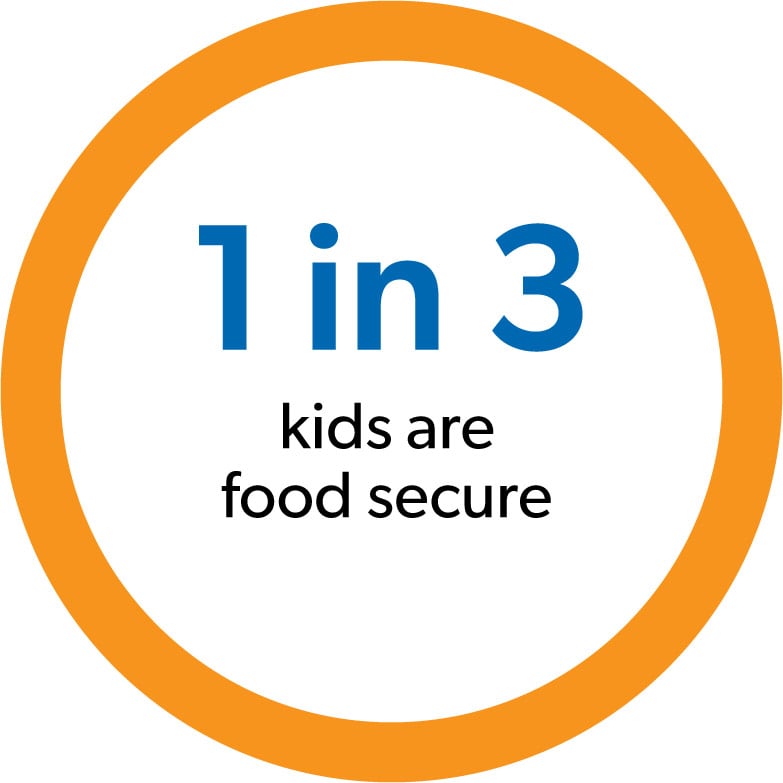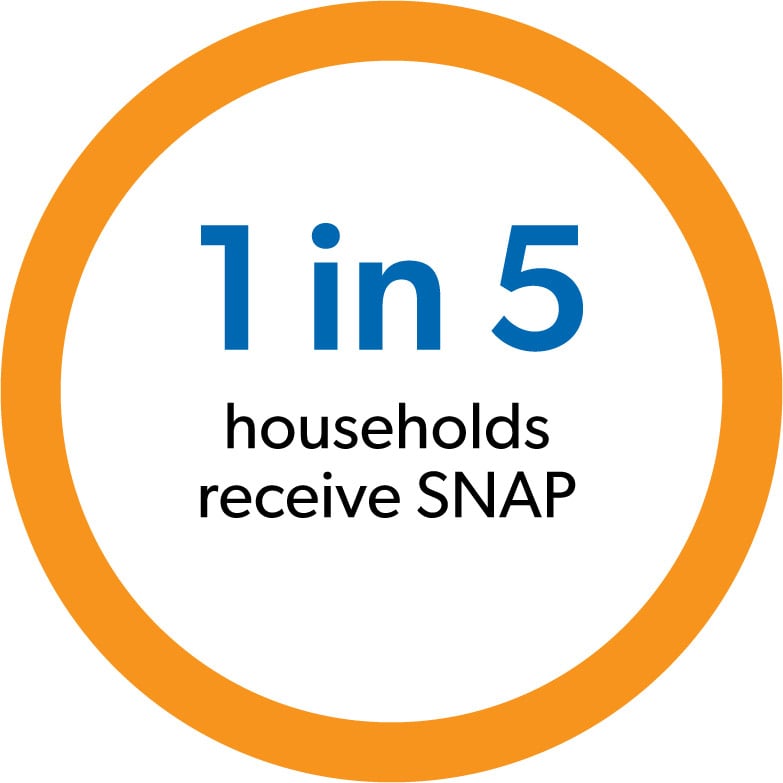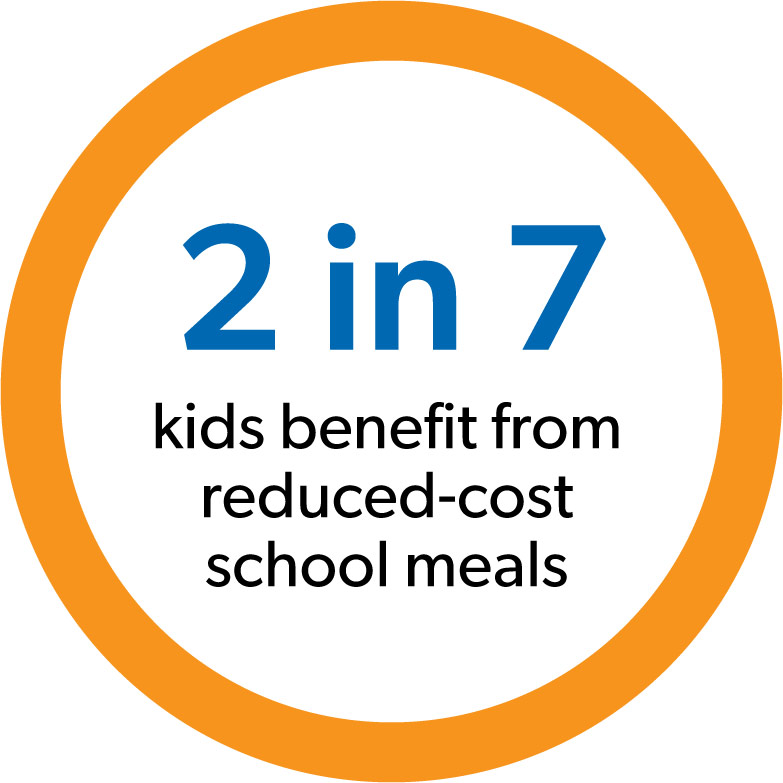Nourishing Communities
At Cook Children’s, we believe that every child has the right to grow up healthy, supported, and nourished. Through our Nourishing Communities program, we are addressing the critical issue of food insecurity in North Texas, where nearly 34% of children in our eight-county service area live in households that cannot consistently afford nutritious meals.1 Food insecurity occurs when an individual does not have access to sufficient nutritious food. This lack of access can stem from various factors, including financial hardship, limited availability of healthy food options, and inadequate support systems. Food insecurity poses both immediate and long-term health risks, affecting physical growth, emotional well-being, and developmental progress. Approximately 2 in 7 school-age children (about 243,100) benefit from free or reduced cost breakfasts or lunches at school, shown to help reduce food insecurity, obesity rates and poor health.2
Community insights



The Supplemental Nutrition Assistance Program (SNAP) is an important component in the fight against food insecurity, providing support to millions of individuals and families. SNAP provides financial assistance to purchase nutritious food, helping to alleviate hunger and improve dietary quality. In the eight-county service area, 21% of children (about 236,400) live in a household that reported receiving food stamps or SNAP benefits in the past year.1
The rollback in SNAP benefits in February 2023 will continue to have a profound impact on vulnerable individuals and families, particularly those already facing economic hardships. In Texas, the total amount of reductions from ending emergency allotments, introduced during the COVID-19 pandemic, was about $189 per household and $81 per person.3 The reduction of SNAP emergency allotments also places additional strain on local food banks and community organizations to bridge the gap left by the reduced benefits. Reduced benefits may lead to increased food insecurity, limiting access to nutritious meals and negatively affecting the health of families and children, ultimately exacerbating social and economic inequalities.1
If you or someone you know is in need of food assistance, there are local resources available to help throughout our community. You can find a local food pantry by visiting the Tarrant Area Food Bank’s “Find Food” map, where you can enter your ZIP code to locate nearby distribution sites and hours of operation. Please call ahead to confirm availability and service times before you go.
Why food security matters
Food insecurity is not just about hunger—it’s about the ripple effects on a child’s overall health and development. Without access to healthy food, children may experience nutrient deficiencies that can impair their growth, weaken their immune systems, and increase their risk of chronic illnesses. Emotional stress from food insecurity also creates instability, which can lead to challenges in learning, behavior, and social interactions.1
Our nourishing communities program directly addresses these challenges, implementing evidence-based strategies to improve the well-being of children and their families.
Just this last month they cut off our SNAP and Medicaid, I had to take time off from work to go to the office to renew the benefits. I had to go the food pantry three to four times and sometimes I reach out to the school and [the school] sends the kids home with a bag of food, snack packs on Friday for the weekend.
How Nourishing Communities make a difference
We address food insecurity through a collaborative approach that focuses on both immediate and long-term solutions. Our key efforts include:
- Screening for food insecurity: implementing tools to identify children and families experiencing food insecurity so they can be connected with the right resources.
- Targeting communities in need: leveraging data to proactively support communities with the greatest need for food access and assistance.
- Increasing access to healthy foods: partnering with local organizations to provide fresh, nutritious foods to underserved areas.
- Promoting child nutrition programs: encouraging enrollment in critical programs like snap and wic, ensuring more families receive the aid they need.
- Community education: hosting workshops and creating resources that teach families about nutrition, healthful eating, and food preparation.
- Building partnerships: collaborating with regional organizations and coalitions to amplify our impact and ensure no child goes unseen.
Join us in fighting food insecurity.
We currently partner with RED Mobile Market, the Good for You Healthy Hub, and other THR Healthy Hubs to fight food insecurity and are looking to expand our partnerships. Whether you’re a caregiver, community leader, or partner organization, your involvement makes a difference. Together, we can build a healthier north texas, one child at a time.
By addressing food insecurity head-on and promoting sustainable change, Cook Children’s is committed to helping every child thrive. Join us in the effort to improve our communities through care, compassion, and collaboration.
Contact us about our program.
For questions or information on our nourishing communities programming, please email dora.garcia@cookchildrens.org
References
1Community Health Needs Assessment Report. (2024). Cook Children’s Health Care System. Fort Worth, Texas; or Cook Children’s CHNA 2024 at www.cookchildrens.org/chna (accessed September 2025). https://www.cookchildrenscommunity.org/data
2Food Research & Action Center. School meals are essential for health and learning. Published May 2021. Accessed September 5, 2024. https://frac.org/wp-content/uploads/School-Meals-are-Essential-Health-and-Learning.pdf
3Rosenbaum D, Bergh K, Hall L. Temporary Pandemic SNAP Benefits Will End in Remaining 35 States in March 2023. Center on Budget and Policy Priorities; 2023.
Access free resources
The Center for Community Health is committed to providing free education and access to our data.